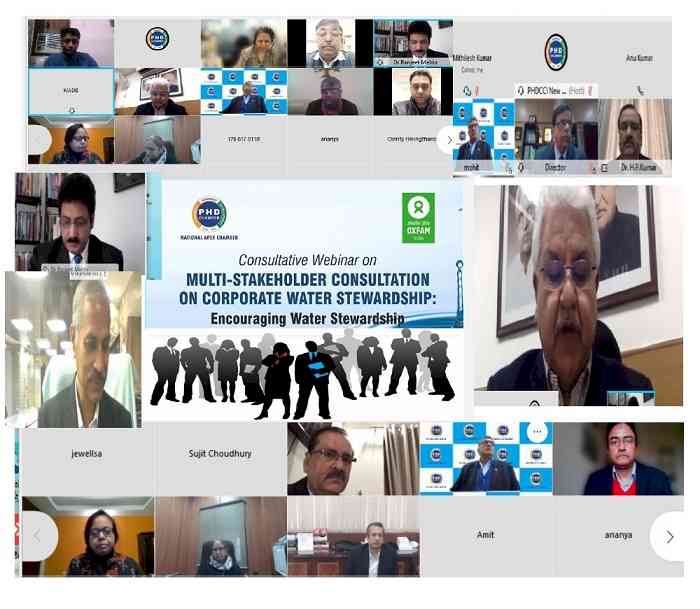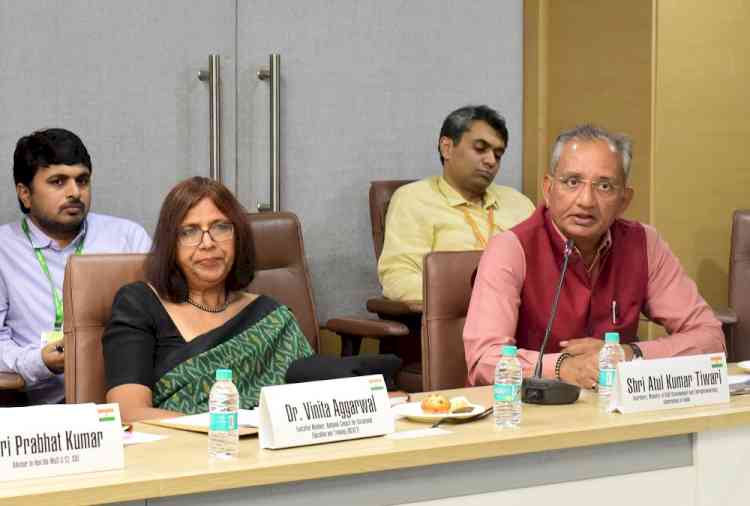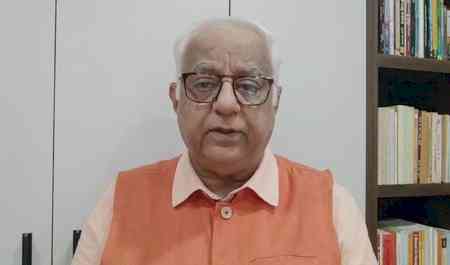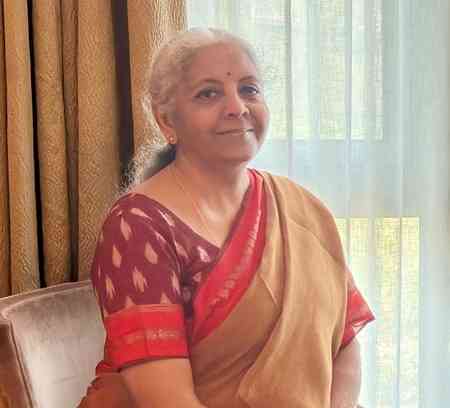Webinar on Multi-Stakeholder Consultation for Corporate Water Stewardship: Encouraging Water Stewardship
The webinar was concluded with closing remarks from Ranjana Das

New Delhi: Water is a shared and precious resource which is essential for life, of that we all agree! People and communities all over the world require water to sustain life and thrive. It is no different for business, as businesses around the world depend on water for their various production processes and long-term sustainability. Being a shared resource, water usage pattern of an entity can sometimes have detrimental effects for the other, if not used desirably and sustainably. As such, no one entity can work in isolation for a credible and feasible water stewardship agenda. As water is a shared resource, the challenges around sustainable water management can only be addressed through active collaboration of multiple stakeholders.
Focusing on the importance of stakeholder-inclusive process for water stewardship, Oxfam India in collaboration with PHD Chamber of Commerce and Industry organized on January 8, 2021, a webinar (part of a two-part webinar series) on "Multi-Stakeholder Consultation for Corporate Water Stewardship: Encouraging Water Stewardship" to explore how stakeholders from multiple sectors can come together and develop a common framework to develop innovative water stewardship strategies as well as the role of the private sector in taking forward the agenda of Corporate Water Stewardship in their policies and practices.
While welcoming the dignitaries Mr. Pradeep Multani, Sr Vice President, PHDCCI said that stewardship is rooted in the concept that robust and effective public water governance is critical to the long-term business viability of water-intensive industries and that companies can play a role in achieving this end.
The webinar which was moderated by Dr. Ranjeet Mehta, Deputy Secretary General, PHDCCI, played host to a very distinguished and expert list of panelists in the form of Mr. Pankaj Anand, Director – Programmes& Advocacy, Oxfam India; Mr. Varun Gupta, Director, Kent RO Systems Limited; Mr. Mohit Jain, Chairperson, MSME Committee, PHDCCI; Mr. Ranjan Dhingra, Co-Chair Water Committee, PHDCCI; Mr. Raghu Babu Nukala, Project Director, GIZ; Dr. Anu Kumar, Principal Research Scientist, CSIRO Land & Water, Australia; Dr. Uma Kapoor, Regional Director, Central Ground Water Authority, Ministry of Jal Shakti; Dr. Narendra Mohan, Director, National Sugar Institute, Kanpur; Dr. H P Kumar, Former Chairman NSIC & Advisor MSME, PHDCCI; Sh. Ranjan Kumar Sinha, Member (RM), Central Water Commission, Ministry of Jal Shakti; Mr. Mukunda Upadhyay, Programme Officer – DRR, Oxfam India; Ms. Ranjana Das, Lead Specialist – Private Sector Engagement, Oxfam India; and more than 100 participants from all over the country ranging from corporates, entrepreneurs, students, businessman, administrators and acamedicians.
Mr. Pankaj Anand delivered the Introductory Remarks in the webinar, emphasizing on the importance of meaningful and active stakeholder-inclusive approach as a path forward towards mainstreaming water stewardship agenda.
Mr. Varun Gupta spoke about water being a sustainability risk for businesses if not properly managed and understood in the context of water stewardship. He also mentioned that Water Footprint Assessment provides a sound foundation of quantitative analysis, which can be used to develop a corporate water strategy and become a water steward.
Mr. Mohit Jain while giving an industry perspective, mentioned the concern about water usage patterns in the private sector, which is rising rapidly. Companies worldwide are recognizing that water is an essential ingredient in their business operations and the lack of access to sufficient water quantity or quality is posing a material risk to a growing number of companies for their sustainability and development.
Mr. Raghu Babu Nukala, while sharing hispresentation on “Tools for Achieving Water Use Efficiency in Industries”, mentioned thatstewardship is about taking care of something that we do not own. Water stewardship is based on the principle of there being a collective need for sustainable water-resources. For private sector, water stewardship is about understanding their water use and impacts, and to work collaboratively and transparently for sustainable water management within a catchment context through stakeholder inclusive process.
Dr. Anu Kumar emphasized on the concept of Social License to Operate and its importance for businesses to understand and consider to continue operations in a sustainable manner, in terms of their water-use patterns and risk-based approaches, as consumers are becoming more aware and concerned regarding environmental costs of production.
Dr. Uma Kapoor, in her presentation highlighted the guidelines to regulate and control excessive ground water extraction in India.
Dr. Narendra Mohan, highlighted the Union government’s policies to help industries in conservation of water and energy. He stressed on water audit and authentication of the best benchmarks achieved by industries. He also stressed the need for sugar industries to acknowledge and recover excess water from cane processing activities and utilize the same in its manufacturing process, thereby consuming less fresh water.
Mr. Ranjan Kumar Sinha while lauding the initiative of Oxfam India and PHD Chamber of Commerce and Industry for organizing the important webinar on water stewardship, assured that the Central Water Commission will be working together towards collective efforts to ensure technological capabilities, policy effectiveness and regulatory framework function seamlessly so as to achieve practical and meaningful solutions to achieve Corporate water stewardship.
Mr. H P Kumar emphasized on the need for mass awareness generation for MSME sector in India on relevant standards, best practices and information on water-efficient and sustainable water utilization technologies and practices.
Mr. Mukunda Upadhyay deliberated through his presentation, understanding water stewardship in the MahakaliBasin in relation to lived geography and experiences and exploring perceptions and narratives from the people on the water foot print of private actors in selected areas of the Mahakali Basin.
The webinar was concluded with closing remarks from Ms. Ranjana Das wherein, she summarized the important takeaways from the webinar and described the webinar as a “beginning of a journey on corporate water stewardship” and emphasized on the overall agreement among the speakers, panelists and participants that there needs to be a formal development of a Corporate Water Stewardship Council as an outcome of the webinar series. / (January 8, 2021)


 cityairnews
cityairnews 








